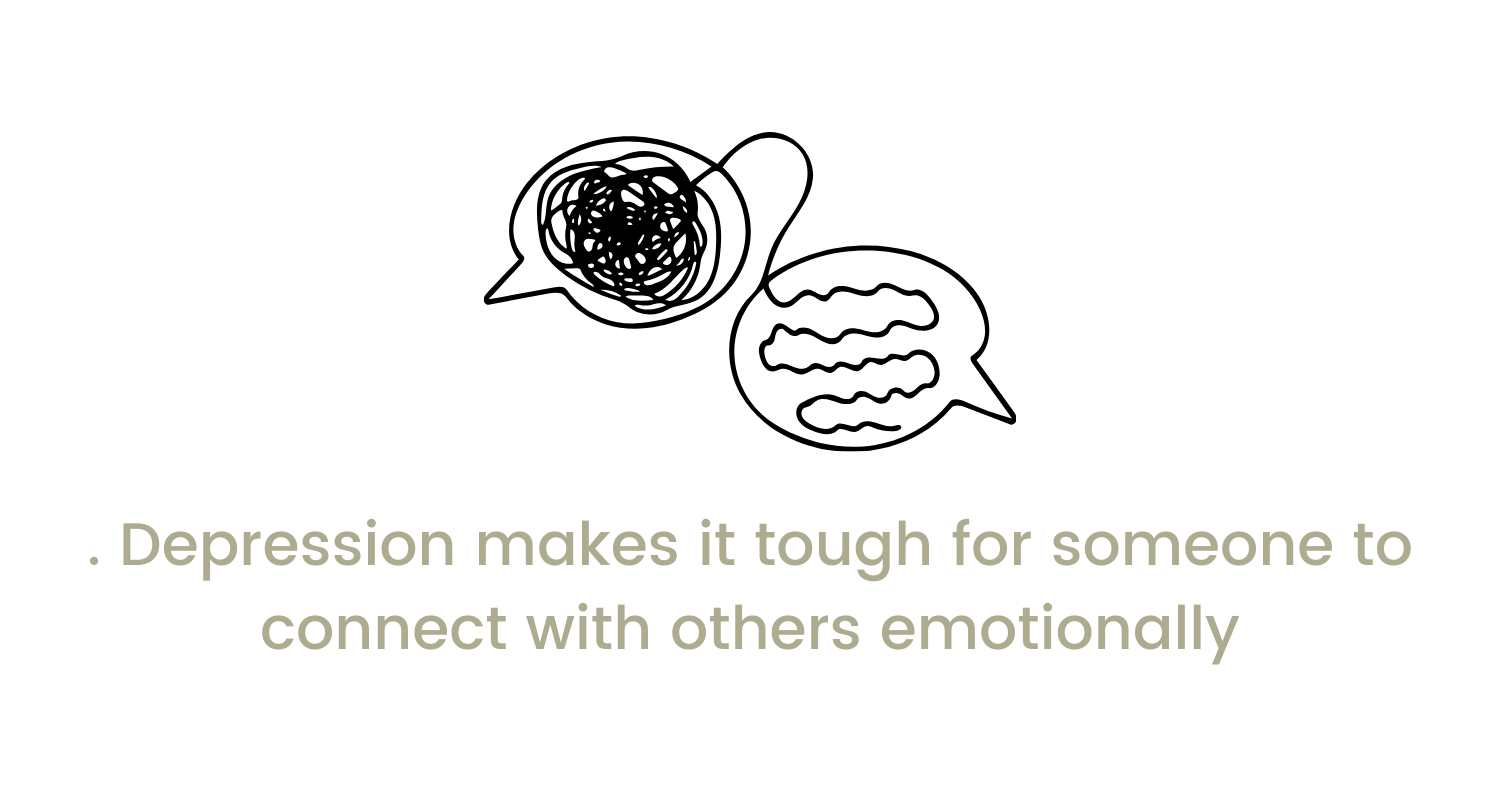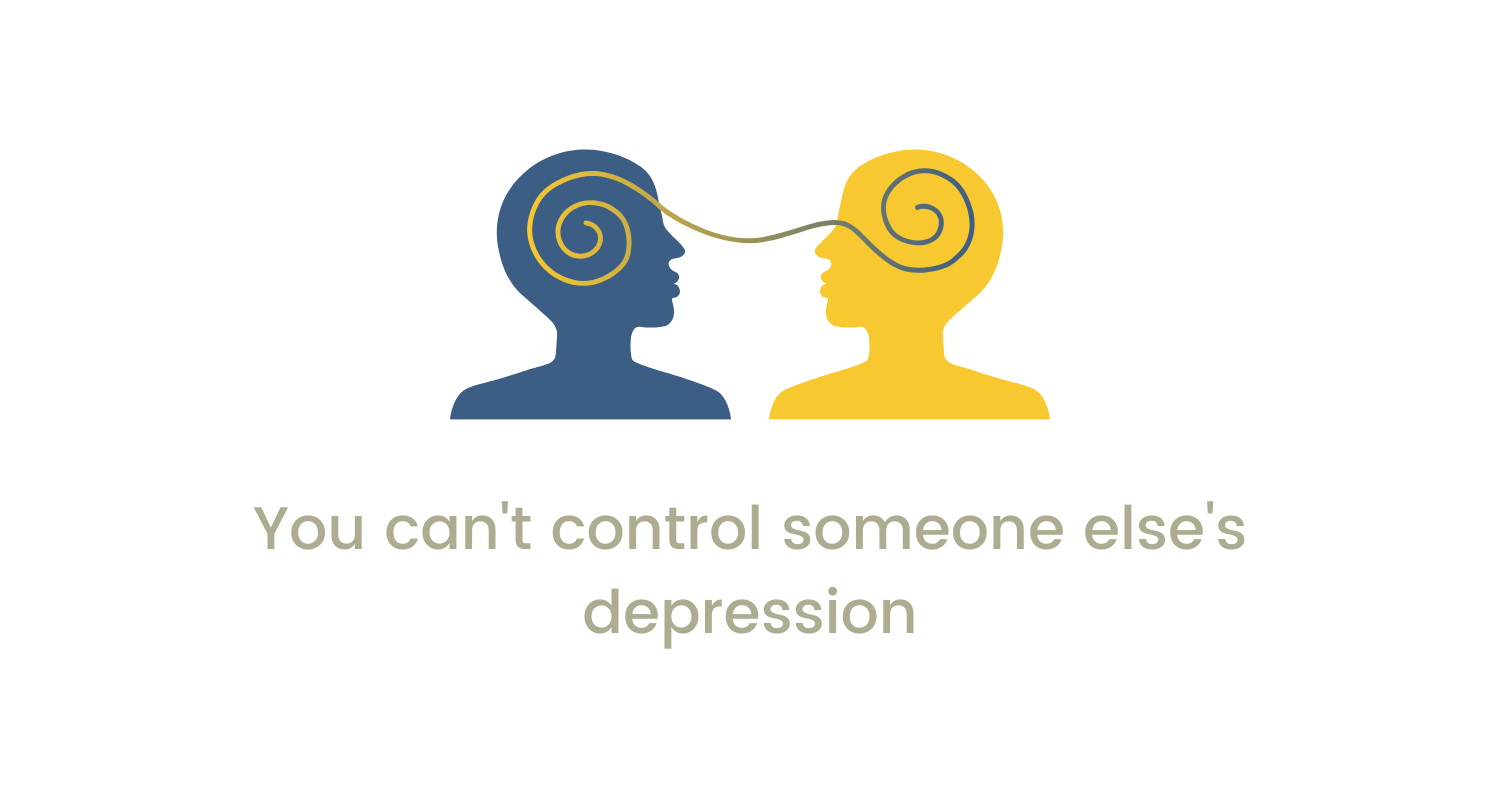Answered: How to help someone with depression
Depression is a serious but treatable problem that affects many people of different ages and backgrounds. It can disrupt daily life and cause a lot of pain for the person going through it and those around them.
If someone you care about is dealing with depression, you might be feeling a mix of tough emotions like feeling unable to help, frustration, anger, fear, guilt, and sadness. These emotions are completely normal.
It's not easy to support a friend or family member with depression, and if you ignore your own well-being, it can become overwhelming.
However, your presence and support can make a big difference in your loved one's recovery. You can assist them in handling their depression symptoms, overcoming negative thoughts, and finding their energy, hope, and enjoyment in life again.
To start, learn as much as you can about depression and how to have constructive conversations with your friends or family members about it. But as you reach out to help, don't forget to take care of your own emotional health too because you'll need it to provide the support your loved one needs.
Table of Contents
How to talk to someone about depression
Understanding Depression
Depression is a serious condition, and it's important not to underestimate how severe it can be. Underestimating mental illness means you can’t fully support your friend or family member who is suffering from the condition(s). In turn, this might mean that their mental illness worsens, leading them to potentially self-harm, attempt suicide, or go to the hospital for treatment.
Mental illness saps a person's energy, hope, and drive. It's not something your loved one can simply overcome by trying really hard.
The signs of depression aren't a personal attack. Depression makes it tough for someone to connect with others emotionally, even with those they care about deeply.
Sometimes, people with depression might say hurtful things or get angry. But it's crucial to remember that it's the depression talking, not your loved one. Try not to take it personally.
Ignoring the problem won't make it disappear. It doesn't help anyone if you make excuses, hide the issue, or lie to a depressed friend or family member. In fact, it might prevent them from getting the help they need.
Your loved one isn't lazy or lacking motivation. When someone is dealing with depression, even thinking about doing things that could make them feel better can feel incredibly tiring or nearly impossible. Be patient as you support your loved one in taking those first small steps toward recovery.
You can't magically cure someone else's depression. Even if you really want to, you can't rescue someone from depression or fix it for them. You're not responsible for causing their depression or making them happy.
While you can offer love and support, the journey to recovery is ultimately in the hands of the person who suffers from depression. At the end of the day, the person with mental illness needs to want to get better, and you can support them on their journey to recovery.
Signs of Depression
Depression symptoms differ from person to person and can include:
Feeling really sad, like you might cry, or feeling empty and without hope.
Getting angry easily, being irritable, or getting frustrated, even over small things.
Losing interest or joy in things you used to enjoy, like hobbies or sports.
Having trouble sleeping, either sleeping too little or too much.
Feeling tired and lacking energy, so even simple tasks feel hard to do.
Changes in appetite, like eating less and losing weight, or eating more and gaining weight.
Having physical problems, like unexplained back pain or headaches.
Feeling anxious, restless, or nervous.
Slower thinking, speaking, or moving your body.
Feeling worthless or guilty, thinking a lot about past mistakes, or blaming yourself for things that aren't your fault.
Having trouble concentrating, making decisions, or remembering things.
Talking about not wanting to live, thinking about suicide, attempting suicide, or having suicidal thoughts.
For many people with depression, these symptoms can make it hard to do daily activities like work or school. Depression can also affect relationships and social activities.
Some people may just feel really miserable or unhappy without knowing why. In children and teens, depression might show up as crankiness instead of sadness.
How to talk to someone about depression
Sometimes, talking to someone about depression can be tricky. You might worry that if you bring it up, they'll get mad, feel offended, or brush off your concerns. You might not know what questions to ask or how to show support.
If you're not sure where to start, these suggestions might help. But remember, being a caring listener is more important than giving advice. You don't have to try to "fix" your friend or family member; you just need to be there to listen.
Often, having a simple conversation can make a big difference for someone dealing with depression. Sometimes they just need to vent instead of hearing how to fix their situation. Encourage the person who's feeling depressed to talk about their feelings, and be ready to listen without judging them.
Don't expect that one chat will solve everything. People with depression often distance themselves from others and keep to themselves. You might have to show your concern and willingness to listen many times. Be gentle but persistent in your approach.
Starting the conversation
Starting a conversation about depression with your loved one can be challenging, but it's an important step. You can begin by saying something like:
"I've been feeling worried about you lately."
"I've noticed some changes in you recently, and I'm wondering how you're feeling."
"I wanted to check in with you because you seem pretty down lately."
Once you've started the conversation, you can ask questions like:
"When did you start feeling this way?"
"Is there something that triggered these feelings?"
"What can I do to support you right now?"
"Have you thought about seeking help?"
Remember, being supportive means offering encouragement and hope. Often, it's about talking to the person in a way that they can understand and respond to, even when they are feeling depressed.
What you CAN say to help:
“You’re not alone. I’m here for you during this tough time.”
“It may be hard to believe right now, but the way you’re feeling will change.”
“Please tell me what I can do now to help you.”
“Even if I’m not able to understand exactly how you feel, I care about you and want to help.”
“You’re important to me. Your life is important to me.”
“When you want to give up, tell yourself you will hold on for just one more day, hour, or minute—whatever you can manage.”
What you should AVOID saying:
“This is all in your head”
“Everyone goes through tough times.”
“Try to look on the bright side.”
“Why do you want to die when you have so much to live for?”
“I can't do anything about your situation.”
“Just snap out of it.”
“You should be feeling better by now.”
The risk of suicide
It might be tough to imagine that someone you care about could ever think about something as serious as suicide, but when a person has depression, they might feel like there's no other way to escape their pain.
Depression can cloud their judgment and make them believe that death is the only solution to their suffering, even if they're usually a rational person.
Since suicide is a real risk when someone has depression, it's crucial to recognize the warning signs:
Talking about suicide, death, or hurting themselves, or being really focused on death.
Expressing feelings of hopelessness or self-disgust.
Engaging in risky or self-destructive actions.
Making arrangements and saying goodbye to people.
Trying to find pills, weapons, or other dangerous objects.
Suddenly feeling calm after feeling depressed.
If you suspect that a friend or family member might be thinking about suicide, don't hesitate to talk to them about your concerns. Many people feel uneasy discussing this topic, but it's one of the best things you can do for someone in such a situation.
Having an open conversation about their thoughts and feelings regarding suicide can save their life. If you're worried, speak up, and seek professional help right away!
Encouraging the person to get help
While you can't make someone's depression go away, you can start by encouraging them to seek help. Convincing a depressed person to get treatment can be tough. Depression takes away their energy and motivation, so even simple tasks, like making an appointment or finding a doctor, can feel overwhelming for them. Depression also fills their mind with negative thoughts, making them believe that their situation is hopeless, and treatment won't help.
That's why it's crucial to help your loved one acknowledge their problem and show them that there is a way to get better.
If your friend or family member is hesitant to get help:
1. Suggest a regular check-up with a doctor. Your loved one might feel less anxious about seeing a family doctor than a mental health specialist. This is a good option because the doctor can rule out any medical causes of depression. If the doctor confirms depression, they can refer your loved one to a psychiatrist or psychologist. Sometimes, hearing this from a "professional" can make a big difference.
2. Offer to assist them in finding a doctor or therapist and accompany them to the first appointment. Finding the right treatment provider can be challenging, and it often involves some trial and error. For someone with depression who already has low energy levels, having help with making calls and exploring their options can be a significant relief.
3. Encourage your loved one to make a detailed list of their symptoms and physical issues to discuss with the doctor. You can also mention things you've noticed as an outsider, like, "You seem to feel worse in the mornings," or "You often get stomach pains before work." This can provide valuable information to the healthcare provider.
If you or your loved one are finding it hard to create a list of symptoms and physical issues, there is a tool to help. Chartam’s Mental Health Planner allows the user to track the severity and frequency of their symptoms over time. This visual data can help your friend or family member better express themselves to their doctor.
Supporting one's treatment
One of the most important things you can do to support a friend or family member with depression is to offer your love and support unconditionally while they go through treatment. This means being kind and patient, even when it's not easy because depression often brings negativity, hostility, and mood swings.
Help out with whatever your loved one needs (and is willing to accept). Assist them in making and attending appointments, researching treatment options, and sticking to their treatment plan.
Keep your expectations realistic. It can be frustrating to see a depressed friend or family member struggling, especially if progress is slow. Patience is crucial because even with the best treatment, recovering from depression takes time.
Set an example. Encourage the person to lead a healthier, mood-improving life by doing so yourself. Maintain a positive attitude, eat well, avoid alcohol and drugs, stay active, and seek support from others.
Promote activity. Invite your loved one to join you in enjoyable activities, like watching a funny movie or dining at a favorite restaurant. Exercise is particularly beneficial, so try to get them moving. Going for walks together is a simple option. Be gentle and persistent in your invitations—don't give up or stop asking.
Lend a hand when you can. Small tasks can be challenging for someone with depression. Offer to help with household chores, but be mindful not to overwhelm yourself in the process!
Taking care of yourself
It's natural to want to solve the problems of people we care about, but you can't control someone else's depression. However, you can control how well you take care of yourself. Your own well-being is just as important as getting treatment for the person with depression, so make sure you prioritize your own health.
Think about what airline flight attendants advise: put on your own oxygen mask before helping others. In simpler terms, ensure that you are healthy and happy before trying to assist someone with depression. You won't be of much help if you become overwhelmed by the pressure of trying to support them. Taking care of your own needs first will give you the energy to be a supportive friend or family member.
Don't be afraid to express your own feelings. You might hesitate to speak up when the depressed person in your life upsets you or disappoints you. However, open and honest communication is crucial for maintaining a healthy relationship. If you keep your feelings to yourself and let resentment build up, your loved one will sense these negative emotions and feel even worse. It's better to gently talk about your feelings before it becomes too difficult to communicate with sensitivity.
Set boundaries. While you want to help, remember that you have limits. If you let your loved one's depression control your life, your own well-being will suffer. You can't be a caregiver all the time without paying a psychological price. To avoid burnout and resentment, establish clear boundaries about what you can and cannot do. You are not your loved one's therapist, so don't take on that role.
Keep up with your own life. While some adjustments to your daily routine may be necessary while caring for your friend or relative, try your best to keep your appointments and social plans with friends. If your loved one is unable to join you on an outing you had planned, invite a friend to go with you instead.
Seek support for yourself. Seeking help or talking to others for support does not mean you're betraying your depressed loved one. Joining a support group, speaking to a counselor or a trusted friend, or confiding in someone you trust can help you get through this challenging time. You don't need to share all the details about your loved one's depression; instead, focus on your own emotions and feelings. Find someone who will listen without interrupting or judging you, and with whom you can be completely honest.
Conclusion
In conclusion, supporting a loved one with depression is a compassionate and vital endeavor. While it may seem daunting, remember that your presence and care can make a profound difference in their journey to recovery.
To be an effective support system, keep these key takeaways in mind:
Open Communication: Encourage honest and empathetic conversations. Let them know you're there to listen without judgment.
Promote Professional Help: Encourage seeking professional treatment. Assisting with research and appointments can be a valuable contribution.
Self-Care: Prioritize your own well-being. Just like in an airplane, put on your own oxygen mask before assisting others.
Set Boundaries: Be realistic about what you can and cannot do. Setting boundaries is essential for both your mental and emotional health.
Patience and Understanding: Understand that recovery takes time. Stay patient and compassionate, even during challenging moments.
Encourage a Healthy Lifestyle: Lead by example and promote a healthy, mood-boosting lifestyle.
Seek Support for Yourself: Don't hesitate to reach out for support when needed. You're not alone in this journey, and seeking help is a sign of strength, not weakness.
By following these principles, you can provide invaluable support to your loved one, helping them navigate the challenges of depression and guiding them toward a path of healing and hope. Together, you can face this journey with resilience, empathy, and unwavering support.









